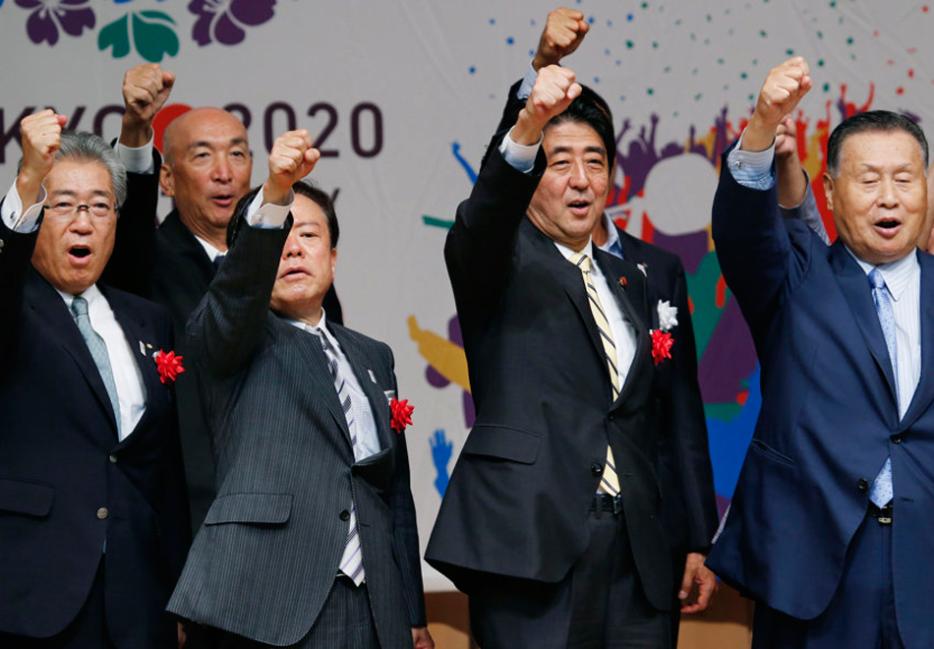Being a host can lead to strange behaviour. You sweep things into unseen corners, throw a jumble of clothes into the closet, bar guests from irredeemably messy bedrooms. The point is to make things look nice. You want to give the impression of orderliness, of a life well-lived, even if in reality everything is in dangerous disarray.
The Olympics are a dinner party for nations. They’re a chance for a country to have people over, show off its nicest corners, and, if at all possible, brush anything unpleasant out of sight. Beijing introduces temporary measures to clear up its catastrophic pollution and promises to ease up on all that censorship and human rights abuse stuff. Whistler ships out its homeless population. Everything sparkles. Then, when the Games end, the hosts go back to their usual, messy lives.
It’s no coincidence, then, that last week, ahead of the IOC’s decision over the weekend to award Tokyo the 2020 Games, Japanese Prime Minister Shinzo Abe announced he was at long last taking serious measures to clean up the Fukushima nuclear plant. As then-aspiring host, Japan wanted to assure the world that everything will be spotless.
In the three-way race against Madrid and Istanbul, Tokyo had long been seen as the Olympic frontrunner, but all week questions about Fukushima hovered over its bid. More than two years after the worst nuclear disaster in a quarter of a century, the area is a mess, the result of a series of bumbling mistakes by Tokyo Electric Power Company (TEPCO) and a series of governments that seem less interested in cleaning up than saving face.
Since the plant was damaged in the 2011 tsunami, TEPCO has been pumping massive amounts of water into the plant to cool the reactors. That radioactive water is then stored in enormous tanks—enough to fill 160 Olympic swimming pools. Last month, TEPCO guiltily admitted that about 300 tons of contaminated water is leaking from those tanks into the ocean each day. Last week, officials found radiation levels 18 times higher than previously reported—enough to kill a person in four hours. Japan’s nuclear watchdog upgraded the severity of the leak from level 1 (an “anomaly”) to a level 3 (a “serious incident”). South Korea announced a ban on all seafood imports from the Fukushima regions.
Few things make people nervier than a nuclear disaster. Radioactive leaks make the globe seem small and uncomfortably vulnerable, with water leaking into oceans that don’t respect national borders. Radioactivity feels like fearsome, mysterious stuff—silently, imperceptibly poisoning individuals, reaching across generations and following genetic lines to attack unborn children. Earthquakes and terrorism are understandable. Radiation feels more like some dark curse.
Unsurprising, then, at an Olympic press conference last Wednesday, the majority of the questions for Japan were about Fukushima. The Olympic selection process, for all its corruption, has become a strange place for the international community to tell wannabe host nations exactly how they feel about them. What about Spain’s 27 percent unemployment rate, questioners wanted to know in regards to Madrid’s bid. How would the violent anti-government protests in Turkey affect Istanbul’s bid?
In the past, the Abe government had seemed less interested in dealing with Fukushima than in restarting Japan’s other nuclear reactors, shuttered for safety checks after the 2011 earthquake. The Olympic bidding process seems to have shifted priorities.
The government, Prime Minister Shinzo Abe announced, will spend nearly half a billion dollars to deal with the leaks. They will build an ice wall around the area to prevent further leakage—an experimental, Game-of-Thrones-evoking solution that at least has the benefit of sounding impressive. On Saturday, Abe traveled to Buenos Aires, where the selection took place, and made a final presentation to Olympic Committee members to convince them that all is well in Fukushima.
“Some have concerns about Fukushima,” he said in his pitch. “Let me assure you the situation is under control. It has never done and will never do any damage to Tokyo.”
The statement, he said, was meant to be as “emphatic and unequivocal” as possible. “The world is closely watching,” he acknowledged before his trip to Argentina, and for now, the world—or at least the IOC—is convinced. The worry, as always, is about what happens when the world stops watching, the party ends, and the hosts are left, once again, to their own devices.






